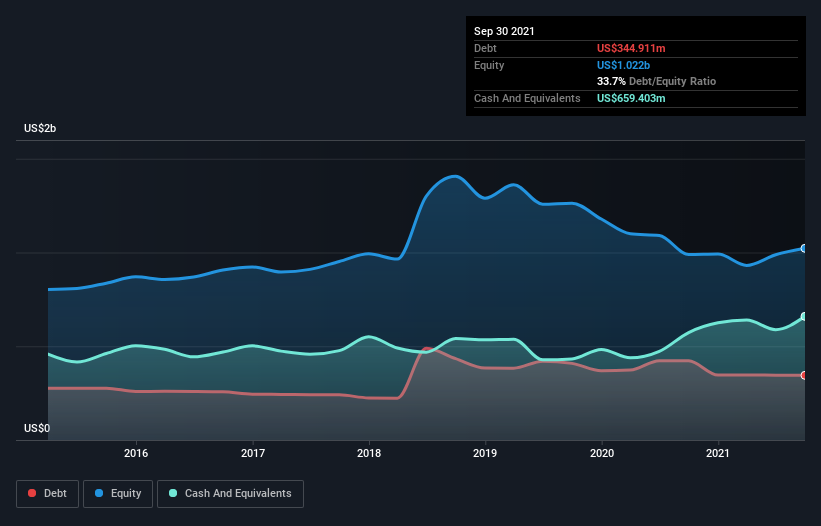- United States
- /
- Construction
- /
- NYSE:GVA
We Think Granite Construction (NYSE:GVA) Can Stay On Top Of Its Debt

Warren Buffett famously said, 'Volatility is far from synonymous with risk.' When we think about how risky a company is, we always like to look at its use of debt, since debt overload can lead to ruin. As with many other companies Granite Construction Incorporated (NYSE:GVA) makes use of debt. But is this debt a concern to shareholders?
When Is Debt Dangerous?
Debt and other liabilities become risky for a business when it cannot easily fulfill those obligations, either with free cash flow or by raising capital at an attractive price. In the worst case scenario, a company can go bankrupt if it cannot pay its creditors. While that is not too common, we often do see indebted companies permanently diluting shareholders because lenders force them to raise capital at a distressed price. Of course, the upside of debt is that it often represents cheap capital, especially when it replaces dilution in a company with the ability to reinvest at high rates of return. The first step when considering a company's debt levels is to consider its cash and debt together.
Check out our latest analysis for Granite Construction
What Is Granite Construction's Debt?
As you can see below, Granite Construction had US$344.9m of debt at September 2021, down from US$422.3m a year prior. But it also has US$659.4m in cash to offset that, meaning it has US$314.5m net cash.

How Healthy Is Granite Construction's Balance Sheet?
According to the last reported balance sheet, Granite Construction had liabilities of US$1.10b due within 12 months, and liabilities of US$439.1m due beyond 12 months. Offsetting these obligations, it had cash of US$659.4m as well as receivables valued at US$888.9m due within 12 months. So its total liabilities are just about perfectly matched by its shorter-term, liquid assets.
Having regard to Granite Construction's size, it seems that its liquid assets are well balanced with its total liabilities. So it's very unlikely that the US$1.58b company is short on cash, but still worth keeping an eye on the balance sheet. Simply put, the fact that Granite Construction has more cash than debt is arguably a good indication that it can manage its debt safely.
We also note that Granite Construction improved its EBIT from a last year's loss to a positive US$86m. There's no doubt that we learn most about debt from the balance sheet. But ultimately the future profitability of the business will decide if Granite Construction can strengthen its balance sheet over time. So if you want to see what the professionals think, you might find this free report on analyst profit forecasts to be interesting.
Finally, while the tax-man may adore accounting profits, lenders only accept cold hard cash. Granite Construction may have net cash on the balance sheet, but it is still interesting to look at how well the business converts its earnings before interest and tax (EBIT) to free cash flow, because that will influence both its need for, and its capacity to manage debt. Happily for any shareholders, Granite Construction actually produced more free cash flow than EBIT over the last year. That sort of strong cash generation warms our hearts like a puppy in a bumblebee suit.
Summing up
While we empathize with investors who find debt concerning, you should keep in mind that Granite Construction has net cash of US$314.5m, as well as more liquid assets than liabilities. And it impressed us with free cash flow of US$98m, being 115% of its EBIT. So is Granite Construction's debt a risk? It doesn't seem so to us. The balance sheet is clearly the area to focus on when you are analysing debt. However, not all investment risk resides within the balance sheet - far from it. For instance, we've identified 1 warning sign for Granite Construction that you should be aware of.
If you're interested in investing in businesses that can grow profits without the burden of debt, then check out this free list of growing businesses that have net cash on the balance sheet.
New: Manage All Your Stock Portfolios in One Place
We've created the ultimate portfolio companion for stock investors, and it's free.
• Connect an unlimited number of Portfolios and see your total in one currency
• Be alerted to new Warning Signs or Risks via email or mobile
• Track the Fair Value of your stocks
Have feedback on this article? Concerned about the content? Get in touch with us directly. Alternatively, email editorial-team (at) simplywallst.com.
This article by Simply Wall St is general in nature. We provide commentary based on historical data and analyst forecasts only using an unbiased methodology and our articles are not intended to be financial advice. It does not constitute a recommendation to buy or sell any stock, and does not take account of your objectives, or your financial situation. We aim to bring you long-term focused analysis driven by fundamental data. Note that our analysis may not factor in the latest price-sensitive company announcements or qualitative material. Simply Wall St has no position in any stocks mentioned.
About NYSE:GVA
Granite Construction
Operates as an infrastructure contractor in the United States.
Solid track record with excellent balance sheet.
Similar Companies
Market Insights
Community Narratives



